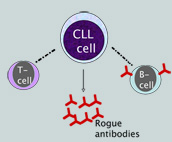Immunology
 CLL cells are immunologically and functionally incompetent, and therefore have difficulty fighting infection. Patients with CLL develop unique problems affecting their immune system which are not seen in other leukemias or lymphomas. As CLL progresses, antibody levels are lowered placing the patient at increased risk for infection, particularly sinusitis, pneumonia and skin infections.
CLL cells are immunologically and functionally incompetent, and therefore have difficulty fighting infection. Patients with CLL develop unique problems affecting their immune system which are not seen in other leukemias or lymphomas. As CLL progresses, antibody levels are lowered placing the patient at increased risk for infection, particularly sinusitis, pneumonia and skin infections.
CLL is a disease of the B-cell lymphocytes. However, as the disease develops, T-cells (an important immune cell which closely interacts with B-cells) are affected and do not function normally. In fact, they are not able to effectively mount an immune reaction against viruses or other infectious agents and have significant difficulties communicating with other immune system cells. This results in an inability to fight viral infections or the reactivation of viruses such as Herpes zoster which causes shingles. Also, the abnormal functioning of the T-cells limits the patient’s ability to have a protective response with vaccinations.
Patients who have received treatment for their CLL have additional problems associated with their immune system. Although chemotherapy is effective at eliminating the leukemia, it also depletes normal immune cells, particularly T-cells. This further suppresses the immunity of the patients, placing them at increased risk of infection for a period of months. Unfortunately, treatment and achieving complete remission usually does not reverse existing immune defects.
Immune dysregulation in both previously untreated patients and previously treated patients can lead to autoimmune diseases. The autoimmune destruction of normal red cells and platelets is common and contributes significantly to patient outcomes.
Current research on the immunology of CLL patients highlights the mechanisms behind the disordered immunity. Methods are being developed to reestablish the immune system and immune function in CLL patients. Additional efforts are ongoing to develop treatment strategies that utilize the immune system to eliminate disease by teaching the immune system to react against the CLL. Finally, patients with CLL have distinct and unique immunologic disorders and defects. By correcting these defects, both the morbidity and mortality of CLL patients could be greatly improved. Therefore, there is an urgent need for continued research in this area.
